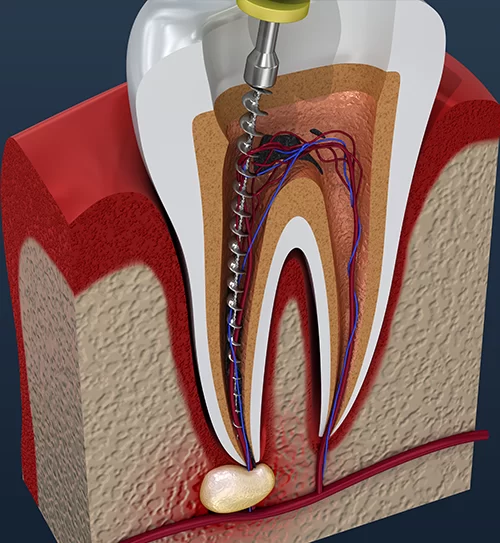
Does a Root Canal Always Mean a Tooth is Lost? Understanding the Root Canal Process
- 1. What is a Root Canal?
- 2. Debunking the Myth: Root Canal and Tooth Loss
- 3. Why a Root Canal Doesn't Mean Losing Your Tooth
- 4. Real-Life Case: How a Root Canal Saved a Tooth
- 5. Conclusion: Keep Your Smile With Root Canal Treatment
1. What is a Root Canal?
A root canal is a dental procedure used to treat infection at the center of a tooth (the root canal system). It is typically required when the pulp (the soft tissue inside the tooth) becomes infected or inflamed due to deep decay, repeated dental procedures on the tooth, or injury to the tooth. The treatment involves removing the damaged pulp, cleaning and disinfecting the inside of the tooth, and then sealing it to prevent future infection.
2. Debunking the Myth: Root Canal and Tooth Loss
One of the most common misconceptions about root canal treatment is that it always results in losing the tooth. In reality, a root canal is often the best way to save a tooth that is badly decayed or infected. If left untreated, an infected tooth can lead to more severe issues, including tooth abscesses, pain, and ultimately tooth loss. By removing the infection and preserving the structure of the tooth, a root canal can restore the tooth’s function and health, preventing the need for extraction.
3. Why a Root Canal Doesn't Mean Losing Your Tooth
Modern advancements in dental technology and techniques have made root canal treatments more effective and less painful than ever before. Rather than removing the tooth, a dentist removes only the infected or damaged pulp and then restores the tooth with a filling or crown. This allows the tooth to remain in place, keeping your smile intact while preventing further damage. In many cases, a root canal treatment can last a lifetime with proper care.
Additionally, root canal treatments are now done with a high degree of precision, allowing dentists to preserve as much of the natural tooth structure as possible. This means that while the internal parts of the tooth are treated, the external structure remains intact, ensuring you keep your tooth and avoid the need for costly replacements like implants or bridges.
4. Real-Life Case: How a Root Canal Saved a Tooth
Consider the case of Sarah, a 34-year-old woman who experienced severe pain in one of her molars. After visiting her dentist, it was revealed that she had an infected tooth pulp due to a cavity that had been left untreated for a long time. Although the idea of a root canal initially scared her, her dentist explained that the procedure would allow her to keep her tooth. After the root canal treatment, Sarah felt immediate relief from pain and discomfort. Her dentist placed a crown on the tooth to ensure its longevity. Years later, Sarah still has her natural tooth and hasn't experienced any issues since.
5. Conclusion: Keep Your Smile With Root Canal Treatment
In conclusion, a root canal does not mean that a tooth will be lost. Instead, it is a procedure designed to save a tooth that might otherwise have to be extracted. By removing infection and preventing further damage, a root canal allows you to keep your tooth and maintain your oral health. If you think you might need a root canal, don’t hesitate to visit a dentist who specializes in root canal therapy. Taking action early can save your tooth and avoid more extensive treatments in the future.
Want to learn more about root canal treatments and how they can help preserve your smile? Visit Dentistry Toothtruth for more information and expert dental care.







 Eastern Dental4.0 (875 review)
Eastern Dental4.0 (875 review) Santa Margarita Pediatric Dentistry4.0 (156 review)
Santa Margarita Pediatric Dentistry4.0 (156 review) Lino Lakes Family Dentistry5.0 (110 review)
Lino Lakes Family Dentistry5.0 (110 review) Aava Dental Mission Viejo4.0 (170 review)
Aava Dental Mission Viejo4.0 (170 review) Summer Smile Dental South Gate4.0 (461 review)
Summer Smile Dental South Gate4.0 (461 review) Capital Dental Care4.0 (20 review)
Capital Dental Care4.0 (20 review) The Importance of Oral Health Education During Pregnancy for a Healthy Pregnancy
The Importance of Oral Health Education During Pregnancy for a Healthy Pregnancy Best Tips for Brushing Your Teeth Properly for Healthy Gums: Essential Techniques for Oral Health
Best Tips for Brushing Your Teeth Properly for Healthy Gums: Essential Techniques for Oral Health Why Skipping Dental Checkups Can Lead to Bigger Oral Health Problems
Why Skipping Dental Checkups Can Lead to Bigger Oral Health Problems Advantages of Porcelain Dental Restorations
Advantages of Porcelain Dental Restorations How Can Diabetes Cause Tooth and Gum Problems? Preventing and Managing Oral Health Issues
How Can Diabetes Cause Tooth and Gum Problems? Preventing and Managing Oral Health Issues Healthy Habits for Promoting Good Oral Health and Hygiene: Tips for a Healthy Smile
Healthy Habits for Promoting Good Oral Health and Hygiene: Tips for a Healthy Smile